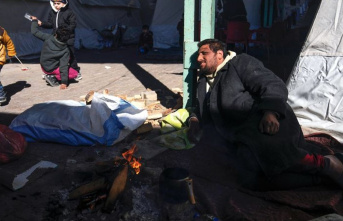Human Rights Watch (HRW) raises serious allegations against Ukraine and Russia. The human rights organization is calling on Ukraine to investigate the widespread use of banned and outlawed land mines, which are believed to have been scattered by the Ukrainian military around the eastern Ukrainian city of Izyum. At the same time, HRW condemned the continued use of anti-personnel mines by Russian troops.
"Ukraine should investigate the alleged use of thousands of rocket-launched anti-personnel mines by its own military in and around the eastern Ukrainian city of Izyum," reads an HRW report. The mines are said to have been scattered during the Russian occupation of the city.
Accordingly, the human rights organization has documented numerous cases in which PFM anti-personnel mines, also known as "butterfly" or "leaf mines", were fired at areas occupied by Russia. Normally mines are laid by hand. However, this type can also be fired or dropped with rockets, aircraft and artillery.
The report is so explosive because Ukraine has been a party to the Anti-Personnel Mines Convention since 1997, which prohibits any use of these landmines. At the end of November, Kyiv had declared that it was sticking to the obligation and had "never considered" using landmines for defense.
The Russian troops are apparently in no way inferior to the Ukrainian ones on this issue. Since the invasion of Russia, HRW has published three reports that Russian armed forces are also using landmines in a targeted manner. Including booby traps activated by victims.
According to Steve Goose, Director of Arms Division at HRW, the Ukrainian armed forces appear to have spread landmines in the Izyum area on a large scale, causing civilian casualties and posing a permanent risk to the people.
He stressed: "The Russian armed forces have repeatedly used anti-personnel mines and committed atrocities across the country. However, this does not justify the Ukrainian use of these banned weapons."
According to HRW, the use of anti-personnel mines violates international humanitarian law because these weapons cannot distinguish between civilians and combatants. Uncleared landmines also lead to displacement, hampered the delivery and distribution of humanitarian goods and hampered agricultural activities, human rights activists said.
Between September 19 and October 9, 2022, HRW researched in and around Isjum and interviewed more than 100 people about landmines. All witnesses stated that they had seen the booby traps. HRW found eleven civilian victims of mines. Health workers said they treated nearly 50 civilians, including five children, injured by mines during and after the Russian occupation.
According to witnesses, Russian troops had put out leaflets warning of landmines. They also cleared mines from public places and private homes and brought some mine victims to Russia for medical care. All of this argues against Russia planting the mines, HRW said. The organization also documented another type of mine used by Russian armed forces.
The Russian military took Izyum and the surrounding areas on April 1, 2022 and held them until Ukraine's counteroffensive in September. Russian forces are accused of arbitrarily arresting, interrogating, torturing or killing people during the occupation.
Quelle: Human Rights Watch











